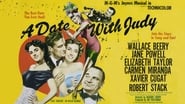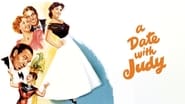Lovesusti
The Worst Film Ever
Fairaher
The film makes a home in your brain and the only cure is to see it again.
AshUnow
This is a small, humorous movie in some ways, but it has a huge heart. What a nice experience.
Isbel
A terrific literary drama and character piece that shows how the process of creating art can be seen differently by those doing it and those looking at it from the outside.
chauge-73253
"A Date with Judy" is one of those throwaway titles that seems like the producers and director spent a whole 30 seconds coming up with, but the rest of the movie certainly isn't rushed. It's mainly about two 16-year-old best friends, Judy (Jane Powell) and Carol (Elizabeth Taylor), who navigate their love lives and argue with their parents, all the while organizing and performing at school functions. Scotty Beckett plays Carol's brother Ogden (or "Oogie", as he is awkwardly nicknamed), who has been dating Judy for some time but has been feeling like Judy's doormat lately. Carol suggests to Oogie that he not always be at Judy's beck and call so he can get some respect back, so he decides to stand Judy up at the next dance. Enter Robert Stack, who plays Stephen, the older man from out of state who comes to help out his uncle at the drug store soda counter for the summer. Because I guess in the forties it was perfectly natural for a man way out of high school to take a 16-year-old girl to a dance, the uncle asks Stephen to take Judy there to make her feel better. Stephen reluctantly agrees, and of course meets Carol. Kinda funny, but 16-year-old Jane is just a child to him, but 16-year-old Carol is just a two year holdout to romance. Granted, you have to check your remote when Elizabeth Taylor first hits the screen in this movie, because you'll swear that it automatically went to pause before you realize it is just you. MGM was obviously using this movie as a warmup for her more mature roles to come, but Taylor does play Carol as both worldly and naive. There is plenty of music and dancing throughout with Powell and Beckett, and you really have to be a fan of 40's crooner music to enjoy it, otherwise it can be tedious. Xavier Cugat and Carmen Miranda have smaller roles as performers at the main dance. Wallace Beery plays Judy's dad Melvin, who is old enough to really be Judy's grandfather, but is written into the script that he is an older Dad to hold down the eye rolling. There is a subplot where after being tired of not knowing how to dance, Melvin hires Miranda to teach him the Rhumba without telling his family. Beery seems to be having a blast with this part and it is a shame that this is one of his last films. The rest of the plot is really the same as most teen movies. If you had it on the beach and filmed it in the sixties, it would easily star Frankie Avalon and Annette Funicello. Will Judy and Oogie make up? Is Stephen really interested in Judy and Carol or is he just humoring them? Watch and see!
jarrodmcdonald-1
This MGM film benefits from strong casting and sincere dialogue, especially in the parent-child scenes. Don't miss the younger actors (especially Elizabeth Taylor and Scotty Beckett) who put real honest emotion into their parts. If only all young performers did such a great job, most of our movies would be so much better today.Jane Powell is the female lead in this picture, and as always, she is appealing. Of course, so are the other leads, Wallace Beery and Carmen Miranda. In fact, Miss Miranda nearly steals the show with her rumba lessons. But most impressive is Leon Ames, as an out- of-touch dad who realizes before it is too late, that his kids need him. I think this is his best performance.
Applause Meter
And so sings Jane Powell, the Judy in the story, entertaining her friends in the Foster family parlor. The MGM Hollywood "dream factory" is in full form here providing yet another idealized view of "typical" American life post World War II. The families are affluent, in comfortable homes and the inhabitants always appear freshly pressed. This is enjoyable movie fluff, reaffirming the mythic idyll of small town USA, a celebration of the American character and way of life. Jane Powell is the perky teen-ager Judy Foster whose dating anxieties, insistence on self- assertion and dealing with the annoying teasing to which her younger brother subjects her--- is what amounts to the sum total of her problems. Love those old time drug store soda fountains so ubiquitous generations ago! Robert Stack appears playing a character with a job description long obsolete; he is the town "soda jerk." Stack, as Stephen Andrews, however, is just a little too mannered and poised to be believable behind the counter of a soda fountain. The job does afford him special privilege, an unobstructed view of the town girls. Beautiful eye-fulls like Elizabeth Taylor, playing rich girl Carol Pringle, frequent the counter ordering humongous chocolate whip cream sundaes as a matter of course. Wallace Beery, a screen veteran and highly gifted actor is the paterfamilias of Judy's family. Beery reputedly was a terror of a man and not shy about his virulent dislike of children. This role where Beery plays Melvin Foster, a husband and father of two, in essence a devoted family man, certainly stands as a testimonial to his acting skill; it is a character diametrically opposed to what he himself was off screen. His Melvin Foster is the epitome of respectability, a solid citizen and businessman who tampers with his reputation by daring to learn to dance the rumba. His teacher is the Latina chiquita, Carmen Miranda, who appears here true to form, showcased in an energetic solo number. Not the best example of the MGM musical genre, but worth watching for nostalgia value.
dougdoepke
This has the stamp of MGM's fabled dream factory all over it—big houses with dutiful servants, spiffy clothes right off the rack, families with perfect diction and manners, and a world where the biggest complication is a date for the prom. Okay, I'm no fan of the dream factory, but then this is a musical, so most any kind of fantasy world is permitted.The trouble is that this musical has too little music, too few chuckles, and too much repetition. Powell and Taylor are good to look at, and for that matter, so is Stack. But whether the 30- year old Stack will end up with the 19-year old Powell or the 16-year old Taylor does get tiresome. It might have worked had director Thorpe gotten some bounce or sparkle into the proceedings. However, things pretty much plod along, that is, until that Brazilian firecracker Carmen Miranda arrives to literally shake things up. I expect the slender material was stretched in order to show off the budding Powell and Taylor. Too bad it also had to show off Hollywood's biggest slice of slobbering ham, Wallace Beery. However, I'm still marveling over how Taylor at 16 can look and act like a gorgeous 35-year old. Amazing.Anyway, this rather flat 113-minutes is a long way from MGM's tradition of lively colorbox musicals. In my book, MGM did manage a couple of sparkling little song & dance features during this same period, also with youthful stars—I Love Melvin (1953) and The Affairs of Dobie Gillis (1953), both with a bubbly young Debbie Reynolds. Catch up with these little gems if you can. Meantime, this one's for those wanting a peek at an idealized time when teenagers were named "Oogie".




